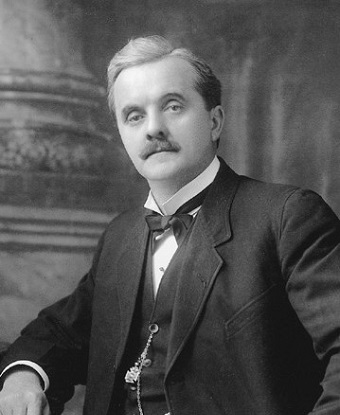Last updated: March 12, 2019
Person
George William Norris

Courtesy Nebraska State Historical Society
George William Norris came to Beaver City, Nebraska in 1885 to practice law. In his three terms as the prosecuting attorney of Furnas County, and in his seven years as judge in Nebraska’s Fourteenth judicial district, Norris's influence was felt in south central Nebraska. However, in his 40 years in the U.S. Congress his outstanding contributions influenced the entire nation.
Norris was born in 1861 in Ohio and after one year at Baldwin University in Ohio, he enrolled in Indiana State Normal School at Valparaiso. During the years he was a school teacher, he also studied law. He then entered law school at Valparaiso and was admitted to the bar in 1883.
In order to have funds to set up a law practice, Norris returned to teaching for a short time, and then in 1884 began a partnership with H.H. Harrington in a law office in Beatrice, Nebraska. Within a year, however, Norris moved to Beaver City in Furnas County, Nebraska, and established a law practice there.
In 1899 Norris moved to McCook, Nebraska. He was elected to the U.S. House of Representatives in 1902 and served five terms. He was elected to the U.S. Senate in 1912, where he also served five terms. He served under seven presidents, from Theodore Roosevelt through Franklin Roosevelt.
Norris's accomplishments during these years that he represented Nebraska in Washington, D.C. included writing the Twentieth Amendment to the U.S. Constitution, which is also known as the "Lame Duck" amendment. He introduced it in the Senate and helped secure its passage in 1933. This amendment provided that Congress convene in January following the election in November, instead of months later. It also advanced the presidential inauguration from March to January.
In the 1930s, there was a huge gap between people in town and people on the farms. Only about 10 percent of U.S. farm families had central station electricity in the mid-30s. Nebraska’s average in 1929 was even lower – only 5.9 percent of farmers had electricity. Almost all urban people had power.
George Norris was Nebraska’s independent Senator from McCook. He knew first hand from growing up on a farm what it was like to live without power. Throughout the 20s, Norris had tried to push through the Tennessee Valley Authority that would build a series of dams on the Tennessee River to provide, among other things, cheap electricity to the rural people of that region. He finally succeeded in 1933. Then he turned his attention to rural residents across the nation.
President Roosevelt was also sympathetic to the need for power on the farm. In 1936, FDR created the Rural Electrification Administration by executive order. To pay for the program, he took $100 million of work relief funds and set them aside for the REA.
Norris is credited with planning the Tennessee Valley Authority, which provided flood control and created electricity in the region drained by the Tennessee River. The TVA, as it is known, was a forerunner of the Rural Electrification Act (REA), which eventually brought electricity to farms and ranches across the nation. Norris is also known for his support of the rights of laborers in collective bargaining.
Norris wrote and promoted the Nebraska constitutional amendment that created the Unicameral Legislature in Nebraska, which is unique among the 50 states.
While Norris was a Republican, except for his last term in office, his attitude and actions were those of a progressive. He had planned to retire in 1936 but was encouraged to run again for the Senate as an independent. He was elected by a large majority. Throughout his years in public office, Norris had received much support from Democrats in Nebraska. In turn, he had campaigned for Alfred Smith (1928) and Franklin D. Roosevelt (1932, 1936, and 1940). Norris's defeat in the Senate race in 1942 was thought to have resulted from his support for these Democratic candidates.
Norris returned to McCook in 1943 and died there on September 2, 1944. He was the first person named to the newly created Nebraska Hall of Fame in 1961.
The Norris Home in McCook, a National Historic Landmark, contains original family furnishings and memorabilia from Norris's years in Washington and is open to the public as a branch museum of the Nebraska State Historical Society.
